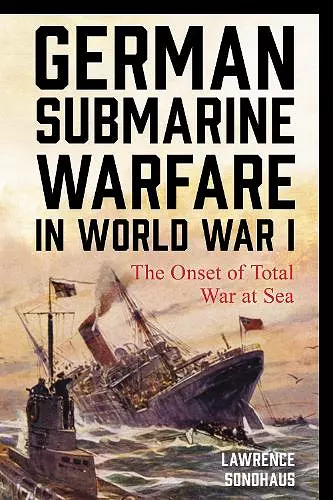German Submarine Warfare in World War I
The Onset of Total War at Sea
Format:Hardback
Publisher:Bloomsbury Publishing PLC
Published:11th Aug '17
Currently unavailable, and unfortunately no date known when it will be back

This compelling book explores Germany’s campaign of unrestricted submarine warfare in World War I, which marked the onset of total war at sea. Noted historian Lawrence Sondhaus shows how the undersea campaign, intended as an antidote to Britain’s more conventional blockade of German ports, ultimately brought the United States into the war. Although the German people readily embraced the argument that an “undersea blockade” of Britain enforced by their navy’s Unterseeboote (U-boats) was the moral equivalent of the British navy’s blockade of German ports, international opinion never accepted its legitimacy.
Sondhaus explains that in their initial, somewhat confused rollout of unrestricted submarine warfare in 1915, German leaders underestimated the extent to which the policy would alienate the most important neutral power, the United States. In rationalizing the risk of resuming the unrestricted campaign in 1917, they took for granted that, should the United States join the Allies, German U-boats would be able to stop the transport of an American army to France. But by bringing the United States into the war, while also failing to stop the deployment of its troops to Europe, unrestricted submarine warfare ultimately led to Germany’s defeat. Because US manpower proved decisive in breaking the stalemate on the Western Front and securing victory for the Allies, Sondhaus argues that Germany’s decision to stake its fate on the U-boat campaign ranks among the greatest blunders of modern history.
Sondhaus, professor of history at the University of Indianapolis, concisely and perceptively analyzes Germany’s U-boat campaign during WWI. He correctly describes the genesis of total war at sea as a response to a British surface blockade that, from the war’s beginning, was an ever-tightening noose around the Reich’s economic windpipe. The German navy’s relative ineffectiveness against its opponent further encouraged the German high command to seek an alternative—even at the risk of offending the U.S., whose economic interests were linked to the principle of freedom of the seas. Germany’s submarine force was small; its primary objective was intercepting warships, not merchantmen. Doctrine and policy for the projected campaign were embryonic, and, as Sondhaus shows, the resulting false start culminated in the 1915 sinking of the Lusitania and significantly antagonized America without seriously troubling Britain. By 1916, with the war stalemated, the German government saw ‘no alternative’ to unrestricted submarine warfare, whatever the risks of U.S. intervention. The results were immediate, Sondhaus notes: America’s declaration of war and the Royal Navy’s adaptation of ‘convoys, countermeasures, and [mine] barrages.’... [Sondhaus] persuasively demonstrates how Germany’s submarine policy cost them the war. * Publishers Weekly *
In this compelling study of the impact of the law on warfare, Lawrence Sondhaus demonstrates how the German decision to adopt unrestricted submarine warfare failed to win the First World War, brought the United States into the conflict, and ultimately sank Imperial Germany. -- Andrew Lambert, Laughton Professor of Naval History, King's College, London
In yet another gem from one of naval history's finest practitioners, Sondhaus offers a brilliant thesis, flawless research, and perfect readability.This investigation into Germany’s choice of unrestricted submarine warfare as one of the earliest applications of total-war thinking and its devastating miscalculations should be widely read and discussed. -- Eric Rust, Baylor University
Lawrence Sondhaus has given us a lucid, engrossing, and well-documented examination of a portentous development in the history of warfare. Those in search of the operational history of German U-boat operations in World War I, accompanied by a pithy analysis of the fateful political and strategic decisions that led to their employment against unarmed merchant vessels, need look no further. -- John Beeler, University of Alabama
The German military’s WW I decision to develop and mobilize the new submarine weapon against Britain and, eventually, all Allied and neutral shipping, dramatically altered the course of the war and, according to noted historian Sondhaus (Univ. of Indianapolis), led to Germany’s defeat. Beginning with the cumbersome technical and political evolution of the Unterseeboote (U-boat) from gasoline and kerosene engines to electricity and batteries, the wartime use of the German U-boat fleet was accepted as a moral equivalent to Britain’s so-called Hunger Blockade of German ports. As happened so many times during the war, Berlin placed the development of technology ahead of tactics and policy. When Germany unleashed submarine warfare, it began the delicate dance that eventually brought the US into the war while failing to prevent the mass transport of US troops to France. Sondhaus, author of more than a dozen highly regarded books on naval history and strategy, writes elegantly and in great detail about Germany’s misuse of its submarine fleet and how it helped to bring about Germany’s defeat, one of the greatest military blunders of the century. * Choice Reviews *
Sondhaus tells his tale well and adds instructive accounts on the operational history of the German submarines. He also offers an interesting account of the contemporary and subsequent German debate about how best to conduct submarine warfare. Drawing heavily on German memoirs, this is a useful contribution to naval history, more especially of World War One. * European History Quarterly *
ISBN: 9781442269545
Dimensions: 237mm x 157mm x 26mm
Weight: 558g
278 pages